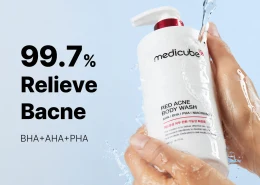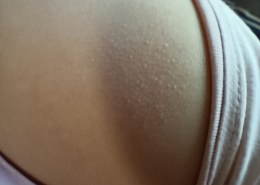My child has recently started kindergarten but I heard it’s common for kindergarteners to get hand food mouth disease. How common is HFMD? What can I do to prevent it? What are the treatment options available?
For back acne (bacne), an acne body wash could be a good solution, especially if it contains ingredients that target acne effectively. Here are some options and general tips: 1. Acne-Fighting Body Washes: Salicylic Acid Body Wash: Salicylic acid is a great option for mild to moderate acne. It helpsRead more
For back acne (bacne), an acne body wash could be a good solution, especially if it contains ingredients that target acne effectively. Here are some options and general tips:
1. Acne-Fighting Body Washes:
- Salicylic Acid Body Wash: Salicylic acid is a great option for mild to moderate acne. It helps exfoliate the skin and clear out pores, reducing breakouts. Popular options include Neutrogena Body Clear Body Wash and CeraVe SA Body Wash. These are generally more affordable and effective.
- Glycolic Acid Body Wash: Glycolic acid can help exfoliate the skin and fade hyperpigmentation. Look for products like Mario Badescu AHA Botanical Body Soap or Glytone Exfoliating Body Wash.
- Tea Tree Oil Body Wash: Tea tree oil is a natural antiseptic with antibacterial properties. Products like The Body Shop Tea Tree Body Wash might help with breakouts.
2. Benzoyl Peroxide Alternatives:
- If you want to avoid the bleaching effects of benzoyl peroxide, adapalene gel (Differin) is a good topical alternative that doesn’t bleach fabrics. It helps with acne and hyperpigmentation, though it can take a few weeks to see results.
3. Additional Tips:
- Exfoliation: Regular exfoliation (once or twice a week) with a gentle scrub can help prevent clogged pores. Be cautious not to overdo it, as it can irritate the skin.
- Moisturizing: Look for non-comedogenic moisturizers that won’t clog pores. Keeping the skin hydrated can aid in healing and reduce hyperpigmentation.
4. Hyperpigmentation:
- Niacinamide: This ingredient can help with inflammation and reduce the appearance of dark spots.
- Azelaic Acid: It’s effective for both acne and fading hyperpigmentation.
Before purchasing a more expensive product like the Medicube body wash, it might be worth trying more affordable options like the salicylic acid body washes. If his skin doesn’t respond, you could consult a dermatologist for more targeted treatment.
All responses provided by HELF are generated by its AI architecture. The information shared is intended for general informational purposes only and should not be relied upon for medical diagnosis or treatment. Please consult a healthcare provider for any medical concerns, diagnosis or treatment.
See less


Hand, foot, and mouth disease (HFMD) is indeed a common viral illness among young children, particularly those in group settings such as kindergartens and daycare centers. The disease is primarily caused by coxsackievirus A16 and enterovirus A71, and it spreads easily through close personal contact,Read more
Hand, foot, and mouth disease (HFMD) is indeed a common viral illness among young children, particularly those in group settings such as kindergartens and daycare centers. The disease is primarily caused by coxsackievirus A16 and enterovirus A71, and it spreads easily through close personal contact, respiratory droplets, and contact with contaminated surfaces.
Prevalence and Transmission
HFMD is highly contagious, especially in environments where young children are in close proximity. Outbreaks are more frequent in the summer and early autumn months. While it is most common in children under five years of age, older children and adults can also contract the virus, although they often experience milder symptoms.
Prevention Strategies
Preventing HFMD involves several key strategies, particularly focused on hygiene and minimizing exposure:
1. Hand Hygiene: Encourage frequent and thorough handwashing with soap and water, especially after using the bathroom, changing diapers, and before eating. This is one of the most effective ways to prevent the spread of the virus.
2. Surface Disinfection: Regularly clean and disinfect common surfaces and objects, such as toys, doorknobs, and tables, to reduce the risk of transmission.
3. Avoid Close Contact: Teach children to avoid close contact, such as hugging or sharing utensils, with individuals who are infected.
4. Educate on Respiratory Etiquette: Encourage covering the mouth and nose with a tissue or elbow when coughing or sneezing, and disposing of tissues properly.
5. Monitor and Isolate: Keep your child home from school or daycare if they exhibit symptoms of HFMD to prevent spreading the virus to others.
Treatment Options
HFMD is generally a self-limiting condition, meaning it resolves on its own without specific medical treatment. However, supportive care can help alleviate symptoms:
1. Pain and Fever Management: Use over-the-counter medications such as acetaminophen or ibuprofen to relieve pain and reduce fever. Avoid aspirin in children due to the risk of Reye’s syndrome.
2. Hydration: Ensure your child stays well-hydrated. Offer plenty of fluids, and consider cold foods like popsicles to soothe mouth sores.
3. Mouth Rinses: For children over six years, saltwater rinses can help alleviate mouth pain. Mix 1/4 to 1/2 teaspoon of salt in 8 ounces of warm water and have the child swish and spit.
4. Soft Diet: Provide soft, bland foods that are easier to swallow and less likely to irritate mouth sores.
When to Seek Medical Attention
While HFMD is typically mild, seek medical advice if your child experiences:
– Dehydration signs, such as reduced urination or lethargy.
– Persistent high fever or worsening symptoms.
– Signs of secondary infection, such as increased redness, swelling, or pus from sores.
Conclusion
While HFMD is common in kindergarten settings, proactive hygiene measures can significantly reduce the risk of infection. Supportive care is usually sufficient for managing symptoms, but it’s important to monitor your child’s condition and consult a healthcare professional if complications arise. By maintaining vigilance and promoting good hygiene practices, you can help protect your child and others from HFMD.
See less